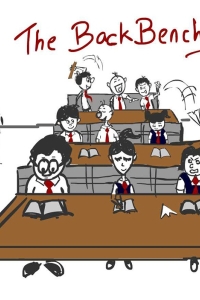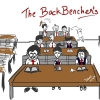
Right from my school days, I was not fond of occupying the front bench. Sitting in front of the teacher meant I had to be meritorious and attentive. Being a mediocre student who often took a nap inside the classroom, I did not deserve to lodge myself in the front row. Remaining under the watchful gaze of the teacher all the time meant depriving myself of the freedom to dig my nose and doodle flowers on the cover of the exercise book. Hence I identified myself more with the backbenchers and preferred to sit somewhere near the middle.
Teachers often seek pen, pencil, scale, or eraser and the top-ranking fellows in the front row fish them out quickly from the box. Several boys rush forward with the items and the teacher picks one without looking up, the one that comes within easy grip. They always have sharp pencils just like their sharp mind, the erasers look clean and the pens run smoothly across the page. Getting the stationery items used by the teacher is a blessing the frontbenchers seek. The disappointed pupils have to wait for the teacher's next order seeking something else. The same mad rush ensues on the following occasion but the teacher is careful to accept it from a different pupil to look impartial, to keep the sense of competition alive among the rest of them.
The boys in the front row get the chance to be summoned to clean the blackboard and they do it with pleasure. These boys carry the exercise books to the staffroom or bring the weekly test copies to the classroom as it is an extra load most lady teachers avoid while climbing the stairs with their high heels. Those occupying the front rows get to build rapport with the teachers who extract what they want, whenever they want. The teachers are usually generous to disclose to the curious front row chaps the top score and the top scorer and the ones who missed it by a narrow margin. Expressions of ecstatic win radiate on their faces much before backbenchers get to know how badly they fared, how they scraped through with pass marks because of liberal marking.
The ones in the front row have to be prepared with the lessons as the teachers prefer to ask them questions first or consult them for updates. Since they are mostly well-read, they answer correctly without mumbling while framing the answers. The teacher does not have to waste time asking the entire class if she focuses on the brilliant group positioned in the front benches.
The class teacher gathers information about other teachers and their progress from the same set of reliable students and also shares the exam schedules with them first. It is the equivalent of big, breaking news. The frontbenchers read out lessons loud enough for only the teacher to hear, remaining oblivious of the fact that the entire class needs to hear them in order to follow them. The front row students quickly establish eye contact with teachers and closely observe their dressing sense? the shades and prints they prefer and the occasional unlocked zip made visible by the untucked shirt fluttering like a curtain in the gentle breeze.
The boys in the front row have to wear clean, ironed clothes and polished shoes as they are also closely examined by the teachers. Most of the time the frontbenchers keep teachers engrossed with intelligent and tough questions heard by the academics alone. The rest of the class is unaware of the goings-on and keeps merrily chatting about sports events and film stars. Backbenchers gather missed updates from front row students after the class gets over? during the recess, while jostling down the corridor.
The front row students are unusually bright and curious about advanced learning. They nod a lot when the teacher explains and interject with a fusillade of queries for teachers. The big classroom then gets reduced to a small tutorial batch. If the teacher has to get anything done like switch on the fan or light, or open the window or shut the door, the front row boys are active and agile to swing into action and execute the orders with alacrity while the backbenchers look lost and deprived of the chance to perform these chores.
The rest of the class sits with the open book and most of the time pretends to follow the lesson. If there is some disturbing noise emanating from the backbenches, the teacher pulls up one and asks him to read the passage or repeat what was read just a while ago. Any disruption in the smooth conduct of the class comes from the backbenchers who engage in all kinds of mischievous activities such as throwing paper planes.
Sitting in the backbenches gives you the chance to gobble your tiffin by lowering your head under the desk to beat untimely hunger pangs, or chew gum with your hand covering the mouth. You can look out of the window to connect with nature instead of listening to the boring class. It is sheer bad luck if the teacher catches you peering out of the window with a wide smile on your face and accuses you of ogling at beauties outside. The martinet teacher is peeved at your temerity and orders you to leave the classroom after he is done with writing vitriolic remarks in your school diary. Finally, you are compelled to forge your parent's signature to avoid disclosures and punishment at home.
The backbenchers do not have to prove they are well-read as it is taken for granted that they are not supposed to perform brilliantly in any subject. So there is no such burden of performance anxiety. These boys have chosen the backbenches because they are casual about studies, and want to chat and have a good time. Some of the backbenchers enjoy sleeping in the classroom when it gets soporific but the teacher cannot always detect the same. It is only when the bell rings that the sleeping fellow wakes up suddenly and stands up in attention mode. It seems as if he has been pulled up to explain his dreamy state.
Backbenchers can gossip about movies and discuss their games and share other plans softly as the teacher tolerates noise up to a certain level and reacts only if it gets loud enough to break his concentration. Backbenchers get the scope to copy answers from friends during class tests. Since the backbenchers are weak in studies, they are not of much help in cheating. Teachers do not like to track what the backbenchers are writing because their glaring mistakes would upset their mood. They always follow what the front row fellows are writing with a clear hand. They are asked individually whether the questions are tough whereas the backbenchers do not get the chance to say whether the paper was tough. The front row boys always crack it with ease.
When the results are out, it is a long walk of shame from the backbenches to the front row, to receive the bleeding red answer script after the teacher completes reading aloud the glaring blunders to the entire class that cannot suppress giggles. Holding the answer script, he lowers his head and resumes his stride to reach his back seat and the boys beside the aisle poke him to repeat the score. Getting qualifying marks or less than that is a shame but he has to show some grace by making a fake promise of improvement.
When the frontbenchers break into peals of laughter and the teacher joins them for fun, as a backbencher you feel inferior and regret your weakness as a slow learner. Other backbenchers score poor marks and bad remarks, and their presence is comforting for you. It is an expression of solidarity when the backbenchers discuss the teacher and conclude how he took revenge because they were the most disturbing elements in the class. The group of bad performers unites to become defiant and create further disturbances and end up getting thrown out of the classroom or sent to the Principal's room.
After the backbenchers leave, the teacher finds total peace to explain to the frontbenchers who support the teacher and malign the backbenchers for wasting their parent's hard-earned money by attending the school just to create nuisance and register their presence. Backbenchers include failures and duds who are slammed for repeating the same class for two years or more. Such backbenchers are the truly experienced heads who have much to share about the teachers. These students are assured of another year in the same class when things turn worse, and those sitting next to them are also threatened with a similar fate.
Using profane language or swear words comes naturally to the backbenchers in multiple languages and they are punished for acts of aggression and fist-thumping on the desk. Backbenchers turn music lovers and wolf-whistle when the teacher stomps out in disgust before the next one walks in. The front benches are traitors who supply confidential information to the teacher about the dubious elements in class. The names of the usual suspects are revealed to the teacher by the frontbenchers. Based on this report, backbenchers are punished without entertaining any claim of innocence made by them. It is like an accused pleading not guilty in front of a judge who cannot be impartial. The blind faith in front row pupils defies logic.
Whenever there is any function or event held in school, the job of lifting chairs and tables is assigned to the backbenchers as the front-bench intellectuals are not sturdy enough for the laborious jobs, or maybe their lives are too precious to be put to any kind of risk. All the delicate jobs of welcoming guests with flowers are left to the frontbenchers while the backbenchers unite and clap thunderously to echo their presence. The backbenchers cast aside their ego and join in? rearrange the furniture items, climb the window grille and reach the ceiling fan height to dangle decoration pieces. Now they feel wanted inside the class? an intrinsic part of it. They do a brilliant job of decking up the room on Teachers? day or during any other celebrations and they stay behind after school hours to get things back in order as the front-benchers have to leave for home. The diligent boys are back in action. The teachers are polite to the backbenchers and give them a faint smile as a sign of encouragement to slog more since it is a job that has to be done well to maintain the goodwill of the school.
Academic sheen is seen early as a sign of prosperity in a career. Perhaps it is expected that the front row fellows will become business leaders and scientists whereas the backbenchers will not lead distinguished lives and settle down with semi-skilled apprentice jobs. The names of most of the frontbenchers are known to the teachers and the most naughty ones also get their names registered in the memory because they are punished a lot. The rest of the backbenchers get identified with? Hey you there, on the extreme left from the second last row, even after months of attending the class.
Backbenchers are expected to win sports prizes and bring glory to the school whereas the frontbenchers enter scholarship contests and quiz contests. Backbenchers rarely have to walk up to the stage on the prize distribution day for academics whereas the front row students keep going up to receive one award after another, with parents watching the grand spectacle inside the auditorium. Some backbenchers participate in dance or singing gigs or play the drums to beat frustration and console themselves.
Being a backbencher during my school days was a blessing in disguise as no teacher got to know what I was fond of. The skills went unnoticed as the backbenchers are not supposed to possess any. The academic system is such that your talent is not allowed to bloom. Most of the frontbenchers did well in English whereas the likes of me did not have a good command of the English language. So my entire life has been a constant struggle to achieve the minimum level of competency in English. The teachers never expected backbenchers could write good stuff as we were supposed to just pass board exams.
Being a backbencher allows you to silently nurture your passion and grow it further without seeking evaluation or encouragement from teachers. It is not something you are doing for good grades but for the sake of pure love. You are trying to write stories but not answering questions on Shakespeare for good marks in the exam. Even if you do not achieve glory, you end up doing something you love and the backbencher tag allows you to escape with it unnoticed since you are never considered eligible for grand achievements.
Writing is a skill like carpentry that you have to pursue for years without any awards or rewards and the backbencher status allows you to begin this practice early as there is no pressure to prove your mettle to the teacher. Twenty years down the line if your teacher reads your piece published in a respected international journal, she is reminded of the backbencher in the classroom who was lazy, slow, and an occasional failure in key subjects. It turns out he has chosen what he wanted to do although the formal education system made no efforts to recognise his area of interest and support his endeavour. Surprisingly, the teacher is now reading a student who was not regarded as well-read and not found capable of writing well according to the literary standards.
Such exceptions do occur in the group of backbenchers just as some mishaps also happen among the frontbenchers who suddenly suffer fatal blows and their bright future gets dark. When the teacher fails to comprehend how an average student outperformed, he is not happy with the improvement of the student who proved him wrong.
Throughout my career in college and university, I have stayed a backbencher as it enables a complete 360-degree view of the room and also helps maintain a healthy distance from the teacher. Wherever possible, keep a low profile, sit last and enjoy the view. Those crazy to get photographed with the bosses and the team jump the rows and sit in front. Those who prefer to work silently without any reward prefer to stay hidden behind the scenes. Being a confessed backbencher allows you to stay mysterious and unpredictable to deliver more surprises in life.
About the Author







Comments